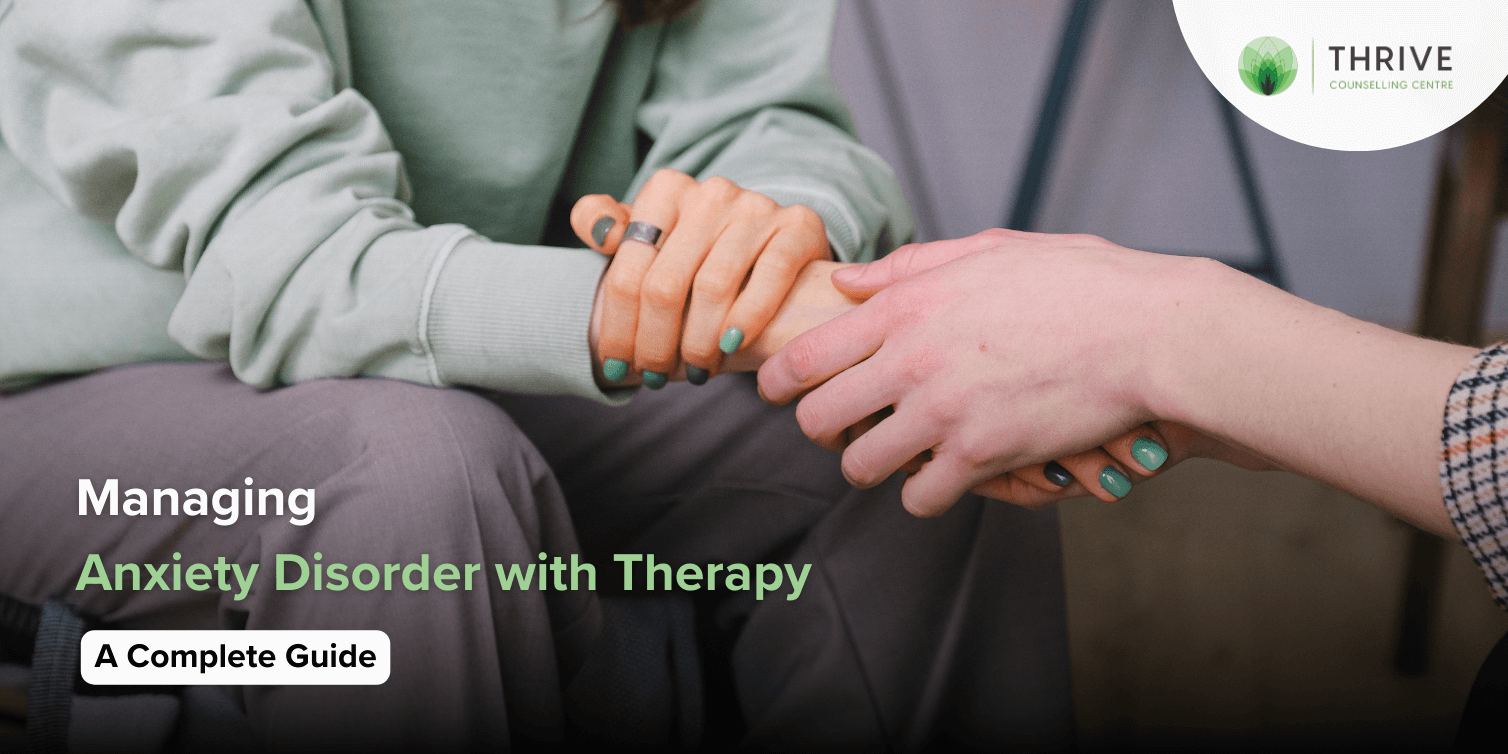Checking Out Various Methods in Therapy for Anxiousness Condition for Lasting Modification
When dealing with stress and anxiety conditions, it's essential to check out a range of counseling techniques. Each technique supplies one-of-a-kind insights and devices to aid you manage your symptoms effectively. You might discover that integrating strategies can generate the very best outcomes. Nonetheless, understanding the subtleties of these approaches is vital to cultivating long-term modification. What if the best combination could launch a new degree of psychological health for you?
Comprehending Anxiety Problems: A Short Introduction
Stress and anxiety disorders, which influence millions of people worldwide, can significantly influence life. You might experience frustrating sensations of worry or stress that seem uncontrollable. These feelings can result in physical symptoms like an auto racing heart, sweating, and even dizziness. Usual kinds of anxiety conditions include generalised anxiety problem, panic attack, and social anxiety condition. Each has distinct indicators, however they all share a propensity to disrupt your regular and relationships.Understanding the source of your anxiousness is crucial. It may come from genetics, mind chemistry, or life experiences. Identifying your triggers can assist you manage your responses much better. It is very important to bear in mind that you're not alone in this battle. Many individuals deal with comparable challenges, and seeking assistance is a strong step towards sensation much better. By discovering concerning anxiety conditions, you're currently on the course to understanding and managing your problem more successfully.
Cognitive-Behavioral Treatment: Challenging Unfavorable Idea Patterns
In Cognitive-Behavioral Therapy, you'll start by determining the adverse thought triggers that contribute to your anxiousness. Once you identify these thoughts, you'll deal with changing them with even more favorable options. With each other, you'll build efficient coping methods to aid handle your anxiousness in day-to-day situations.
Identifying Negative Thought Triggers

When you experience moments of distress, recognizing the particular triggers behind your negative thoughts can be crucial in taking care of anxiety. Start by paying interest to circumstances that provoke feelings of worry or fear. Is it a crowded room, an approaching deadline, or a discussion with particular individuals? Jot down these instances in a journal. This will help you identify patterns in your thinking. Notification physical feelings that accompany your negative ideas, like a racing heart or rigidity in your breast. By identifying these triggers, you gain insight right into what's fueling your anxiety. Understanding these links is the primary step in testing those thoughts and inevitably regaining control over your psychological actions.
Replacing Ideas With Positives
Testing unfavorable idea patterns is a crucial action in changing your mindset and minimizing stress and anxiety. You may usually locate on your own trapped in cycles of insecurity or catastrophic thinking. Rather of allowing these ideas determine your sensations, practice replacing them with sensible alternatives or positive affirmations. As an example, when you assume, "I can't manage this," move it to, "I can manage obstacles one action each time." This straightforward adjustment can substantially impact your emotion. Consistently determining and countering these unfavorable thoughts helps produce a much healthier inner discussion. Bear in mind, it takes some time and effort, however continually exercising this technique can cause long-term adjustment, encouraging you to face stress and anxiety with renewed confidence and resilience.
Building Coping Techniques Together
Replacing negative ideas is just the beginning of managing anxiousness efficiently. To create long lasting change, you require to build coping techniques that equip you. Cognitive-Behavioral Treatment (CBT) assists you recognize and test those purposeless idea patterns. Together, you and your counselor can discover how these thoughts effect your feelings and behaviors.Start by establishing useful strategies, like journaling or mindfulness workouts, that enable you to confront anxiousness head-on. When you encounter your worries slowly, you'll learn to respond in different ways.

Mindfulness and Acceptance-Based Approaches: Growing Present-Moment Understanding
As you navigate the intricacies of stress and anxiety, incorporating mindfulness and acceptance-based approaches can considerably enhance your ability to cultivate present-moment awareness. By concentrating on the right here and currently, you'll find that you can observe your thoughts and feelings without judgment (Counseling services for anxiety). This technique helps you recognize your anxiousness without feeling bewildered by it.Engaging in mindfulness exercises, such as deep breathing, body scans, or assisted reflections, allows you to ground on your own in your existing experience. Acceptance-based techniques motivate you to accept your emotions as opposed to fight against them. When you approve your feelings, they lose their power over you.Incorporating these practices into your everyday routine can transform just how you react to stress and anxiety. You'll create resilience and discover to browse stressful scenarios with higher convenience. Eventually, cultivating present-moment awareness lays the foundation for lasting change, equipping you to lead a much more satisfying life
Exposure Treatment: Challenging Anxieties Progressively
Exposure therapy helps you face your fears in a gradual way, making it less overwhelming. You'll find out strategies to deal with anxiety-provoking situations detailed, while additionally building coping techniques to manage your responses. This method encourages you to take control and reduce anxiety with time.
Progressive Direct Exposure Strategies

When encountering stress and anxiety, progressively confronting your concerns can be an effective method to restore control. This technique, referred Recommended Site to as gradual exposure, entails slowly exposing on your own to the circumstances or things that cause your anxiousness. Start with less daunting scenarios and gradually work your way up to even more difficult ones. As an example, if you're worried of public speaking, you may start by speaking before a mirror, then progress to sharing ideas with a buddy, and at some point resolve a tiny group. Each step helps desensitize you to the fear, developing your self-confidence in time. Bear in mind, it's vital to rate on your own and commemorate little triumphes as you relocate with this process, strengthening your capacity to manage stress and anxiety successfully.
Building Coping Approaches
Structure effective coping techniques is crucial for handling anxiousness, particularly as you challenge your fears progressively - Counseling services for anxiety. One powerful method is direct exposure therapy, where you begin by encountering your concerns in a regulated manner. Begin with much less intimidating circumstances and slowly function your method approximately even more tough situations. This steady exposure helps desensitize you to anxiety activates, making them much less overwhelming.Incorporate relaxation methods, such as deep breathing or mindfulness, to soothe your mind during direct exposure. Track your progress, celebrating little success in the process to increase your confidence. Remember, it's fine to take your time; the goal isn't perfection but constant improvement. By developing these strategies, you'll equip on your own to browse anxiety and welcome life a lot more totally
Psychodynamic Treatment: Discovering Root Reasons of Anxiety
Psychodynamic treatment explores the unconscious mind, revealing the source of your anxiousness. By examining your ideas, sensations, and past experiences, this strategy helps you uncover underlying disputes and unresolved concerns that might add to your existing anxiety. You'll function with a specialist to check out youth experiences, partnerships, and emotional patterns that form your reactions today.As you acquire insight into these deeper layers of your mind, you'll begin to recognize how past events affect your present habits. This understanding can lead to catharsis, permitting you to process feelings you could have suppressed.Through the restorative relationship, you can additionally determine defense systems that may have developed with time, supplying a clearer course to change. Eventually, psychodynamic treatment equips you with the devices to address your stress and anxiety at its core, advertising enduring makeover in your emotional wellness.
Holistic and integrative Approaches: Combining Strategies for Greater Efficiency
Integrating various restorative techniques can boost your journey towards managing stress and anxiety better. By integrating aspects from cognitive-behavioral therapy, mindfulness techniques, and holistic techniques, you can create an individualized method that resolves your distinct requirements. You could utilize cognitive-behavioral methods to test negative thought patterns while including mindfulness exercises to ground on your own in the present moment.Additionally, checking out alternative methods such as yoga or meditation can promote relaxation and reduce anxiety signs. This mix enables you to create higher self-awareness and resilience.Experimenting with these diverse methods can help you find what resonates most with you. Keep in mind, it has to do with finding a synergy that functions, as opposed to adhering to a solitary method. This integrative technique not only supplies prompt relief that site however also promotes lasting skills for managing stress and anxiety, equipping you to redeem control over your life.
The Role of Assistance Equipments: Structure Strength With Connection
While it could seem that handling anxiousness is a singular journey, having a solid assistance system can play an important function in your strength. Bordering on your own with compassionate pals, family members, or assistance teams develops a secure space where you can freely share your feelings and experiences. You advise yourself that you're not alone in this struggle.These relationships supply encouragement and can provide sensible coping approaches that have functioned for others when original site you connect with others. It's additionally an opportunity to gain perspective; pals can aid you see situations in different ways, lowering sensations of isolation.Moreover, psychological support fosters a feeling of belonging, which can substantially relieve anxiety signs. By leaning on your support group, you can develop resilience and take on challenges better. Remember, connecting for assistance suggests toughness, and it can make all the distinction in your journey toward handling stress and anxiety.
Regularly Asked Concerns
What Are the Usual Symptoms of Stress And Anxiety Conditions?
You may experience uneasyness, exhaustion, trouble focusing, irritation, muscle mass stress, and rest disruptions. Physical signs can consist of quick heart beat, sweating, and trembling. Recognizing these indicators early can aid you look for proper support and treatment.
Exactly How Long Does Therapy Typically Last for Stress And Anxiety Conditions?
Therapy for stress and anxiety disorders usually lasts anywhere from a couple of weeks to numerous months. It actually depends upon your private requirements, progress, and the methods your specialist utilizes to assist you handle your anxiousness properly.
Can Drug Be Utilized Together With Therapy for Stress and anxiety?
Yes, drug can absolutely be utilized alongside treatment for anxiousness. Incorporating both strategies usually improves treatment performance, aiding you handle symptoms while exploring underlying concerns through therapy (Counseling services for anxiety). Constantly consult your healthcare provider for personalized suggestions
Are There Self-Help Techniques for Managing Anxiousness?
Yes, there are a number of self-help strategies for handling anxiousness. You can exercise mindfulness, engage in normal exercise, keep a balanced diet plan, develop a routine, and make use of deep breathing methods to aid reduce stress and anxiety signs and symptoms successfully.
How Do I Know if I Need Expert Help for Anxiousness?
